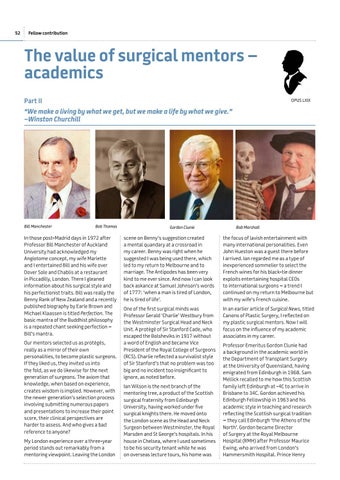52
Fellow contribution
The value of surgical mentors – academics Part II
OPUS LXIX
“We make a living by what we get, but we make a life by what we give.” –Winston Churchill
Bill Manchester
Bob Thomas
In those post-Madrid days in 1972 after Professor Bill Manchester of Auckland University had acknowledged my Angiotome concept, my wife Mariette and I entertained Bill and his wife over Dover Sole and Chablis at a restaurant in Piccadilly, London. There I gleaned information about his surgical style and his perfectionist traits. Bill was really the Benny Rank of New Zealand and a recently published biography by Earle Brown and Michael Klaassen is titled Perfection. The basic mantra of the Buddhist philosophy is a repeated chant seeking perfection – Bill’s mantra. Our mentors selected us as protégés, really as a mirror of their own personalities, to become plastic surgeons. If they liked us, they invited us into the fold, as we do likewise for the next generation of surgeons. The axiom that knowledge, when based on experience, creates wisdom is implied. However, with the newer generation’s selection process involving submitting numerous papers and presentations to increase their point score, their clinical perspectives are harder to assess. And who gives a bad reference to anyone? My London experience over a three-year period stands out remarkably from a mentoring viewpoint. Leaving the London
Gordon Clunie
Bob Marshall
scene on Benny’s suggestion created a mental quandary at a crossroad in my career. Benny was right when he suggested I was being used there, which led to my return to Melbourne and to marriage. The Antipodes has been very kind to me ever since. And now I can look back askance at Samuel Johnson’s words of 1777: ‘when a man is tired of London, he is tired of life’.
the focus of lavish entertainment with many international personalities. Even John Hueston was a guest there before I arrived. Ian regarded me as a type of inexperienced sommelier to select the French wines for his black-tie dinner exploits entertaining hospital CEOs to international surgeons – a trend I continued on my return to Melbourne but with my wife’s French cuisine.
One of the first surgical minds was Professor Gerald ‘Charlie’ Westbury from the Westminster Surgical Head and Neck Unit. A protégé of Sir Stanford Cade, who escaped the Bolsheviks in 1917 without a word of English and became Vice President of the Royal College of Surgeons (RCS). Charlie reflected a survivalist style of Sir Stanford’s that no problem was too big and no incident too insignificant to ignore, as noted before.
In an earlier article of Surgical News, titled Canons of Plastic Surgery, I reflected on my plastic surgical mentors. Now I will focus on the influence of my academic associates in my career.
Ian Wilson is the next branch of the mentoring tree, a product of the Scottish surgical fraternity from Edinburgh University, having worked under five surgical knights there. He moved onto the London scene as the Head and Neck Surgeon between Westminster, the Royal Marsden and St George’s hospitals. In his house in Chelsea, where I used sometimes to be his security tenant while he was on overseas lecture tours, his home was
Professor Emeritus Gordon Clunie had a background in the academic world in the Department of Transplant Surgery at the University of Queensland, having emigrated from Edinburgh in 1968. Sam Mellick recalled to me how this Scottish family left Edinburgh at -4C to arrive in Brisbane to 34C. Gordon achieved his Edinburgh Fellowship in 1963 and his academic style in teaching and research reflecting the Scottish surgical tradition – they call Edinburgh ‘the Athens of the North’. Gordon became Director of Surgery at the Royal Melbourne Hospital (RMH) after Professor Maurice Ewing, who arrived from London’s Hammersmith Hospital. Prince Henry





























